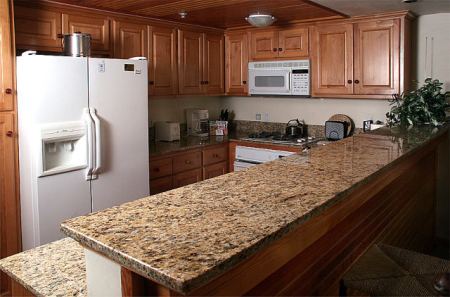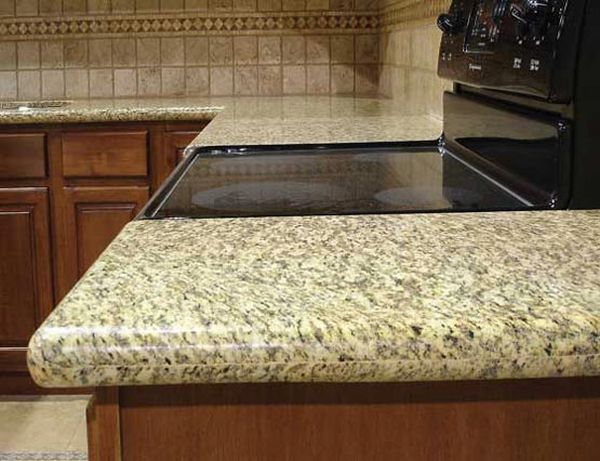Our kitchen can never be complete without a countertop. This is one of the furnishings that make kitchen operations easier. It is the space where we can chop our food. When we are done cooking, this can be the area for plating. It is just the perfect space for food preparation and displaying kitchen items. No wonder it is important because it is one of the most utilized spaces in the kitchen. Because people never cease to stop using countertops, it is important to find the best one.

1. Slab granite countertop
These are the oldest in practice slabs for our kitchen. Large slabs are quarried and fabricated by experienced installers to suit our kitchens.
Pros: It increases kitchen value and has no or very few seams.
Cons: Having high price these are colorless, odorless and have danger of radio active presence.
2. Modular granite kitchen countertop
These are medium sized granite sheets, larger than tiles but smaller than slabs that can easily be DIY-installed in kitchen.
Pros: Hardest, relatively easy to install. As compared they are inexpensive.
Cons: Seams are found.
3. Tile granite countertop
These are cheapest and easiest type to install, small, manageable tiles that can be purchased from tile stores.
Pros: Gives kitchen value. Supports good laminate works better than tile granite. Easy to install.
Cons: Has many seams in the granite to impede our cooking preparation.
4. Quartz kitchen countertop
This has a natural kitchen countertop surface and are used as pulverized quartz, plus resins to hardness and binding.
Pros: Look beautiful and release high resale value.
Cons: Exceedingly heavy. Must be installed only by experienced installers.
5. Solid surface countertops
Kind of largely acrylic polymer-based countertop material like Corian. They clear away the dirt easily.
Pros: Cheaper than granite or quartz. Minor scratches can be sanded or buffed easily with a sandpaper.
Cons: They are prone to scorching and scratching.
6. Laminate countertops
Light to carry, inexpensive to purchase.
Pros: Inexpensive and easy to set up.
Cons: Can peel up, scrip and scorch up easily.
7. Tile kitchen countertops
Ceramic tile ranges from six inches to twelve inches square. Cheap and simple to install, but the multiplicity do not hold good.
Pros: Cheapest of all and can be self installed.
Cons: Many tiles seem and are prone to cracks.
8. Concrete counters
This countertop gives a very high end, high value and a creative look.
Pros: Very unique in style and look. Can be shaped to fit any size.
Cons: Heavy materials which need expensive custom work.
9. Stainless steel counters
Stainless steel, as a counter surface, is durable, sleek and very impressive.
Pros: Beautiful, germ resistant and polished out.
Cons: Difficult to fabricate and pricey.
10. Soapstone counters
Akin to marble and impart a classic look on our kitchen.
Pros: Warm feeling due to the presence of talc in materials, has unique look.
Cons: Not hard will gouge, scratch and expensive.
11. Paper composite
These are eco friendly alternative to other composite countertops unlike laminates.
Pros: Non petroleum based eco friendly made by recycled paper material.
Cons: Not readily available in the market requires special order.
12. Recycled glass slab countertop
Slab can be derived from glass tiles or mosaic, glass slab is one continuous, seamless piece.
Pros: Uses recycled glass, hard and non absorbent with unique colors.
Cons: Costly and often had to obtain.
13. Recycled glass tile
A substitute for the costlier and better recycled slab glass, and can easily be self installed.
Pros: Easy availability, in expensive and installed easily.
Cons: Seems to exist in between tiles.
14. Recycled aluminum countertop
These countertops have recycled Aluminum looks same as steel countertops.
Pros: Eco friendly, looks as steel finish, made by recycled materials.
Cons: Softer than stainless steel countertops.
15. Reclaimed wood counters
Made by reclaimed wood from Barns, flooring and siding.
Pros: Imparts classic look, eco friendly and highly distinctive.
Cons: Requires sealing with tung oil.




